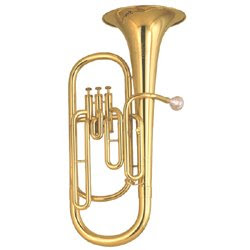
So, I'm learning the baritone horn.
I had intended to learn the cornet/trumpet, but the guy who is teaching me at an exceptionally reasonable rate suggested a baritone would be more suited to me, physically, and since I get to borrow one for free I thought I'd give it a go.
The fact that it uses exactly the same fingering to produce the same notes (within a different octave range) also made it an easy sell.
He was right - it is a better fit. I sound worse than when I was learning the cornet/trumpet because I'm starting again on a new instrument so I have to redevelop technique, but I can produce a larger range of notes without busting a gut. My lips seem better suited to the larger mouthpiece, and I have the lung power to make it work (although I'm going to have to build up some serious intercostal-diaphragmatic muscles to make it work smoothly). Trying to play my pocket trumpet after practicing the baritone for a while is... shall we say "interesting". And I was just starting to get the hang of it, too.
Anyway, having come from playing the piano, recorder and a bit of concertina, I'm having some difficulty wrapping my head around this "transposing instrument" thing that brass has got going on.
In my world, a C is a C. I can handle playing an instrument that is tuned to a different key, as long as I know that when I look at a C on the sheet music and play a C on the instrument, I am actually playing the note that is written, and could therefore play the same music with any other instrument and make the same notes (give or take an octave). The idea that I can look at a C on the sheet music, play what is supposed to be a C on the instrument, but in fact be playing a completely different note is a bit disturbing.
And yet, it seems from my limited research that a heck of a lot of brass instruments play X number of tones above or below what is written. What's the point of that? Surely its just as easy to know what a C actually is on the instrument instead of picking an easier one to hit and saying "this can be C for us"?
Why spend so much time and effort learning to play scales that aren't actually the scales you're playing? Why get to the point where playing the sheet music is a breeze, if it's all a big fat lie?
And, of course, whoever composes brass music knows (somehow) that the cornet is actually playing a Bb instead of a C, while the (French) Horn is actually playing an F instead of a C, while the Tenor Horn is actually playing an Eb instead of a C...
And then, supposedly, when you write for certain instruments in treble clef they are transposing, but when you write for the same instruments in bass clef they are non-transposing - which means the players need to know what a "real" C is anyway so they can play it in the bass clef...
What the heck? How come no one has turned around and said: "Transposing octaves is one thing, but the rest of you are a bunch of nutjobs and should just learn to read the music, dammit!"
I'm trying to work out exactly how I transpose the sheet music in my brain so that I can play the "true" notes when I need them, but my tired little brain is having issues with that...
I played double horn but never thought of it as being tuned to a particular key or what the thumb valve did...it could produce every note so it was in essence chromatic. Not like a basic harmonica or something.
ReplyDeleteI think being a piano player before that flattened my view of things -- tunings and clefs.
Of course alto and tenor clef would have been total Greek to me, luckily I never had to read in them.
Transposing itself isn't that much of a problem - I do it with my other instruments all the time. It's just that, when it comes to brass, they keep lying to me. They tell me what I'm playing is a C, when it's not, and when they ask for a D what they're really after is a C...
ReplyDeleteI'm learning the "wrong" notes, and I know when I read a piece of music that's written for brass I'm reading the "wrong" notes. Somehow, through the magic of brass orchestration, it's all supposed to work out in the end, but I feel like it shouldn't.
It's just somehow vaguely disturbing. Like someone telling you that, in a particular context, the word "lettuce" actually means "cucumber" while "cucumber" actually means "onion", and then telling you to ask for a sandwich with "extra lettuce and no cucumber".
Just plain weird, an unnecessarily complicated, in my humble opinion.